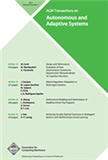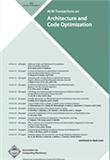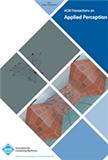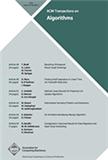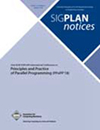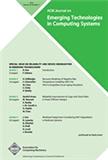DATA & KNOWLEDGE ENGINEERING
SCIE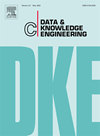
- 雜志名稱:數(shù)據(jù)和知識工程
- 簡稱:DATA KNOWL ENG
- 期刊ISSN:0169-023X
- 大類研究方向:工程技術(shù)
- 影響因子:1.583
- 數(shù)據(jù)庫類型:SCIE
- 是否OA:No
- 出版地:NETHERLANDS
- 年文章數(shù):31
- 小類研究方向:工程技術(shù)-計(jì)算機(jī):人工智能
- 審稿速度:約12.0個(gè)月
- 平均錄用比例:較易
官方網(wǎng)站:http://www.journals.elsevier.com/data-and-knowledge-engineering/
投稿網(wǎng)址:https://www.evise.com/evise/faces/pages/login/login.jspx?resourceUrl=%2Ffaces%2Fpages%2Fnavigation%2FNavController.jspx%3FJRNL_ACR%3DDATAK%26
DATA & KNOWLEDGE ENGINEERING
英文簡介atabase Systems and Knowledgebase Systems share many common principles. Data & Knowledge Engineering (DKE) stimulates the exchange of ideas and interaction between these two related fields of interest. DKE reaches a world-wide audience of researchers, designers, managers and users. The major aim of the journal is to identify, investigate and analyze the underlying principles in the design and effective use of these systems. DKE achieves this aim by publishing original research results, technical advances and news items concerning data engineering, knowledge engineering, and the interface of these two fields.DKE covers the following topics:1. Representation and Manipulation of Data & Knowledge: Conceptual data models. Knowledge representation techniques. Data/knowledge manipulation languages and techniques.2. Architectures of database, expert, or knowledge-based systems: New architectures for database / knowledge base / expert systems, design and implementation techniques, languages and user interfaces, distributed architectures.3. Construction of data/knowledge bases: Data / knowledge base design methodologies and tools, data/knowledge acquisition methods, integrity/security/maintenance issues.4. Applications, case studies, and management issues: Data administration issues, knowledge engineering practice, office and engineering applications.5. Tools for specifying and developing Data and Knowledge Bases using tools based on Linguistics or Human Machine Interface principles.6. Communication aspects involved in implementing, designing and using KBSs in Cyberspace.Plus... conference reports, calendar of events, book reviews etc.
DATA & KNOWLEDGE ENGINEERING
中文簡介數(shù)據(jù)庫系統(tǒng)和知識庫系統(tǒng)有許多共同的原則。數(shù)據(jù)與知識工程(DKE)促進(jìn)了這兩個(gè)相關(guān)領(lǐng)域之間的思想交流和互動(dòng)。DKE吸引了世界各地的研究人員、設(shè)計(jì)師、管理人員和用戶。期刊的主要目標(biāo)是識別、調(diào)查和分析設(shè)計(jì)和有效使用這些系統(tǒng)的基本原則。DKE通過發(fā)布有關(guān)數(shù)據(jù)工程、知識工程和這兩個(gè)領(lǐng)域的接口的原始研究成果、技術(shù)進(jìn)展和新聞項(xiàng)目來實(shí)現(xiàn)這一目標(biāo)。DKE涵蓋以下主題:1、數(shù)據(jù)和知識的表示和操作:概念數(shù)據(jù)模型。知識表示技術(shù)。數(shù)據(jù)/知識操作語言和技術(shù)。2、數(shù)據(jù)庫、專家或基于知識的系統(tǒng)的體系結(jié)構(gòu):數(shù)據(jù)庫/知識庫/專家系統(tǒng)的新體系結(jié)構(gòu)、設(shè)計(jì)和實(shí)現(xiàn)技術(shù)、語言和用戶界面、分布式體系結(jié)構(gòu)。3、數(shù)據(jù)/知識庫的構(gòu)建:數(shù)據(jù)/知識庫設(shè)計(jì)方法和工具、數(shù)據(jù)/知識獲取方法、完整性/安全性/維護(hù)問題。4、應(yīng)用、案例研究和管理問題:數(shù)據(jù)管理問題、知識工程實(shí)踐、辦公室和工程應(yīng)用。5、使用基于語言學(xué)或人機(jī)界面原理的工具指定和開發(fā)數(shù)據(jù)和知識庫的工具。6、在網(wǎng)絡(luò)空間中實(shí)施、設(shè)計(jì)和使用KBS涉及的通信方面。加上…會議報(bào)告、活動(dòng)日程、書評等。
DATA & KNOWLEDGE ENGINEERING
中科院分區(qū)| 大類學(xué)科 | 分區(qū) | 小類學(xué)科 | 分區(qū) | Top期刊 | 綜述期刊 |
| 計(jì)算機(jī)科學(xué) | 4區(qū) | COMPUTER SCIENCE, ARTIFICIAL INTELLIGENCE 計(jì)算機(jī):人工智能 COMPUTER SCIENCE, INFORMATION SYSTEMS 計(jì)算機(jī):信息系統(tǒng) | 4區(qū) 4區(qū) | 否 | 否 |
DATA & KNOWLEDGE ENGINEERING
JCR分區(qū)| JCR分區(qū)等級 | JCR所屬學(xué)科 | 分區(qū) | 影響因子 |
| Q4 | COMPUTER SCIENCE, INFORMATION SYSTEMS | Q4 | 1.5 |
| COMPUTER SCIENCE, ARTIFICIAL INTELLIGENCE | Q4 |
DATA & KNOWLEDGE ENGINEERING
中科院JCR分區(qū)歷年趨勢圖DATA & KNOWLEDGE ENGINEERING
影響因子精選同類領(lǐng)域期刊,熱門推薦輕松get~
-
- ACM Transactions on Autonomous and Adaptive Systems
- 期刊ISSN:1556-4665
- 大類研究方向:工程技術(shù)
- 影響因子:
- 數(shù)據(jù)庫類型:SCIE
- 咨詢投稿
-
- ACM Transactions on Architecture and Code Optimization
- 期刊ISSN:1544-3566
- 大類研究方向:工程技術(shù)
- 影響因子:1.444
- 數(shù)據(jù)庫類型:SCIE
- 咨詢投稿
-
- ACM Transactions on Applied Perception
- 期刊ISSN:1544-3558
- 大類研究方向:工程技術(shù)
- 影響因子:
- 數(shù)據(jù)庫類型:SCIE
- 咨詢投稿
-
- ACM Transactions on Algorithms
- 期刊ISSN:1549-6325
- 大類研究方向:工程技術(shù)
- 影響因子:
- 數(shù)據(jù)庫類型:SCIE
- 咨詢投稿
-
- ACM SIGPLAN NOTICES
- 期刊ISSN:0362-1340
- 大類研究方向:工程技術(shù)
- 影響因子:
- 數(shù)據(jù)庫類型:無
- 咨詢投稿
-
- ACM Journal on Emerging Technologies in Computing Systems
- 期刊ISSN:1550-4832
- 大類研究方向:工程技術(shù)
- 影響因子:2.013
- 數(shù)據(jù)庫類型:SCIE
- 咨詢投稿
精選常見問題,答疑解惑輕松get~
- 三篇ssci論文怎么同時(shí)投出去
- 中文核心和sci哪個(gè)影響力更大
- 中科院一區(qū)和JCR一區(qū)期刊占比區(qū)別
- 發(fā)ssci如何快速找合適的期刊
- 資源保護(hù)方面論文投sci指導(dǎo)
- 外貿(mào)行業(yè)論文發(fā)ssci周期長嗎
- 國外的sci投到錄用一般多久
- ssci期刊國內(nèi)認(rèn)可度
- 核能應(yīng)用論文翻譯英文發(fā)sci容易的方法
- 人口老齡化研究論文符合ssci領(lǐng)域嗎
- sci開源和不開源分別是什么意思?有什么影響?
- ssci發(fā)表是高水平學(xué)術(shù)論文嗎
- 生態(tài)修復(fù)主題英文論文會收錄哪些數(shù)據(jù)庫
- 哲學(xué)專業(yè)論文發(fā)英文期刊
- 中科院sci四個(gè)區(qū)的劃分
- ssci期刊和sci期刊的區(qū)別
- ESCI和SCIE要分清
- ssci送審論文多久出結(jié)果
- ssci論文二作有用嗎
- 水土保持類英文期刊好選嗎
- ssci期刊論文一定會檢索嗎
 投稿咨詢
投稿咨詢

